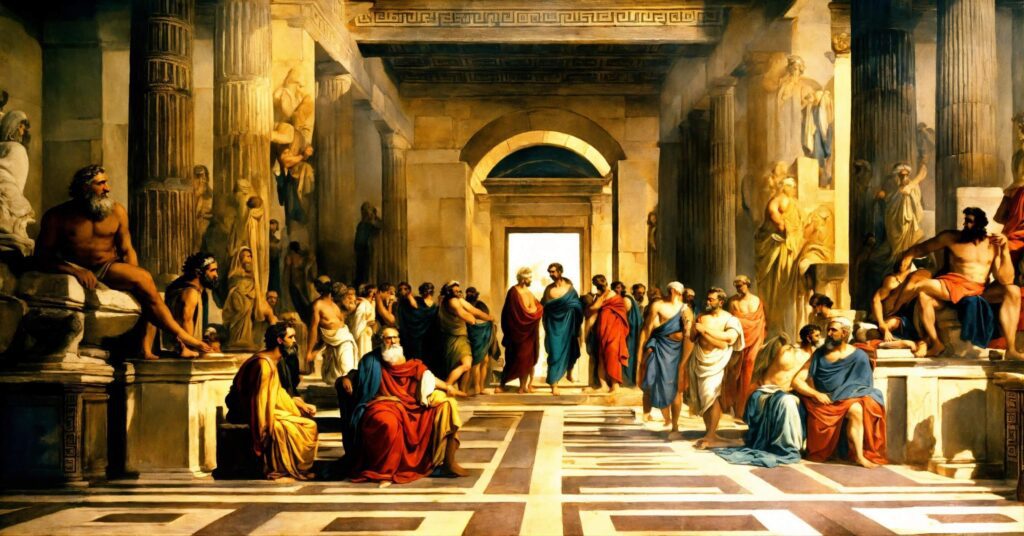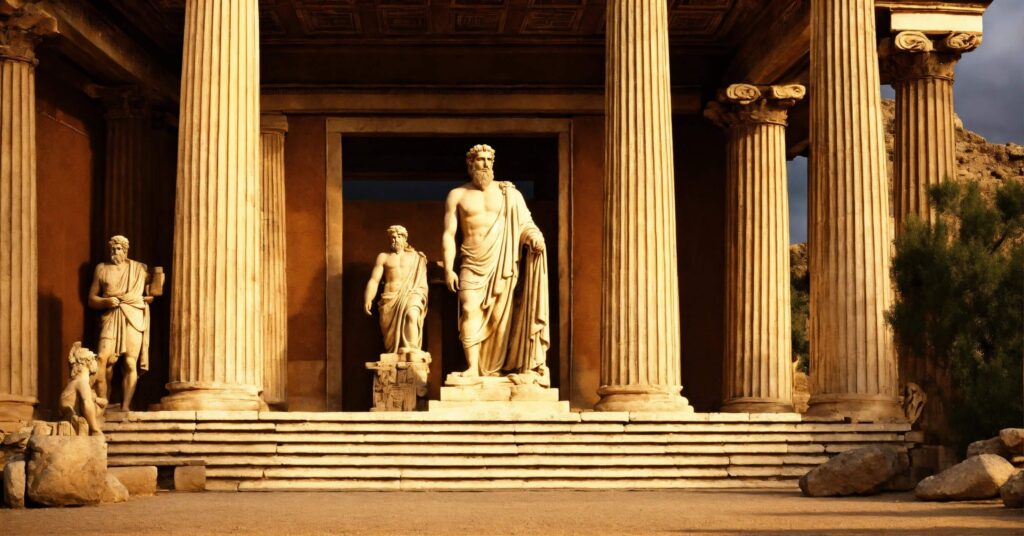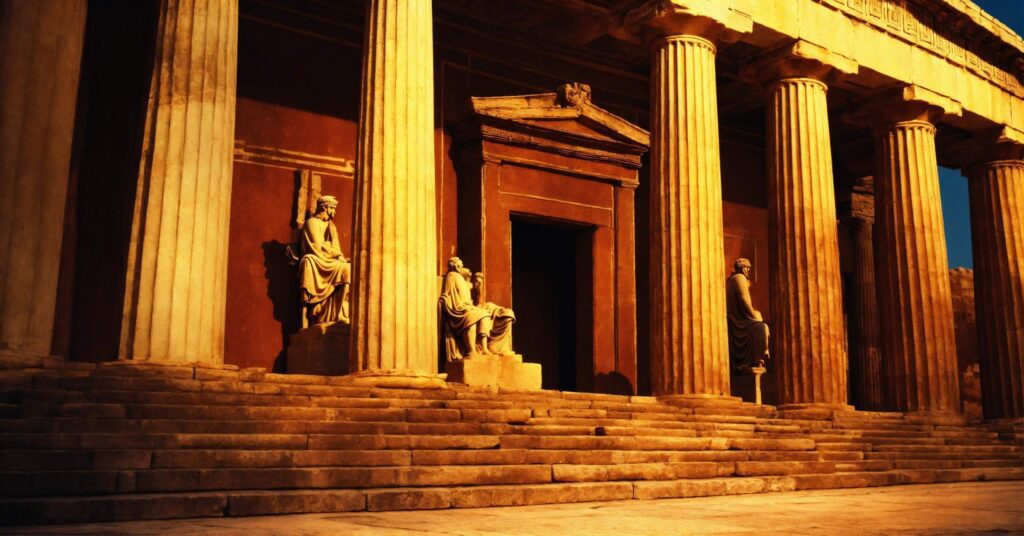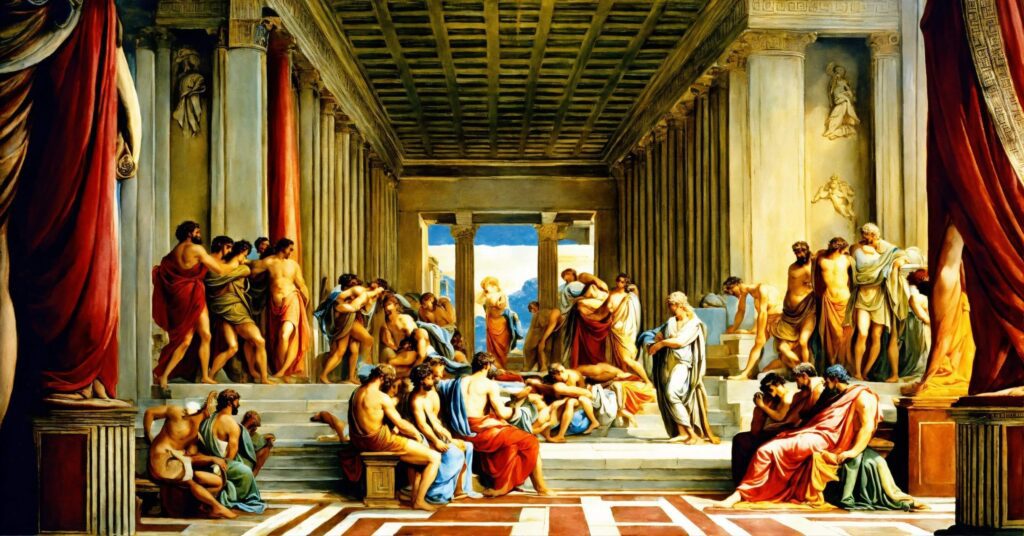Introduction: the Greek way of Thinking
Only continuity was realistic in the Greek way of thinking. Cows are born and die, but it was always in the form of cows that remained the same. Behind the turmoil of so many, concrete things were invariable, eternal forms.
So the Greek philosophers before Socrates explored what was behind the visible phenomena. So Thales is water, and Anaksimandros is confrontational (so Anaksimandros is very close to modern physics that claims the concept of symmetry). Democritus explored the atom.
The ancient West refers to the 1,200-year history of starting as an urban state centered on the Aegean Sea and the Mediterranean Sea and then forming two huge empires. This period is divided into two stages again.
The surrounding nature and the way they observed it had a very important influence on the formation of the characteristics of ancient Greeks and the determination of their fate.
Geographically, Greece is a place where conflicting natural phenomena are constantly replaced, but there is not much difference between them. Long mountain ranges cut through the ground, resulting in countless small, closed valleys and plateaus, and countless bays and berths.
On beaches in Pediatric Asia and beaches in Greece, where culture will begin, and numerous islands scattered over the Aegean Sea, conflicting elements between the ground and the sea meet under the deep blue sky and permeate each other for many years.
The Greeks enjoy an extremely mild and warm climate, baptized with full light. After traveling to Europe, Herodotus claims Greece has “by far the best climate” among many countries. Irregular beaches and bright light, which are the boundaries between land and sea, are the decisive factors in the formation of the character of the Greeks.

The Ancient Greek period is divided into stages
The first stage is the stage in which the Greeks colonized the east coast of the Aegean and various islands off the coast of Southern Italy to form the first scientific civilization by accumulating wealth through international trade, but was incorporated into the Great Empire by Alexander the Great. Of course, this empire is just a third of the way.
The second stage was the Roman Empire, covering vast territory in the East, West, North, and South of the Mediterranean Sea. Later, it was divided into East and West, and the ancient world ended when the Western and Eastern Roma were destroyed one after another due to the invasion of the ethnic group.
Among them, ancient Greek philosophy began in the first stage, the B.C. 7-century One of Asia and various islands off the coast of Southern Italy, in the Eastern and Western colonies of Greece, blossoming in Athens and then tilting in Rome, finally ending with an “order for the suspension of heretical education” by the Eastern Roman Emperor Justinus in A.D. 529. This 1,200-year history of philosophy is divided into three parts.
The first period is 400 years from the beginning of philosophy to Aristotle’s death. This period is again divided into two periods, and the first period is about 200 years from the beginning of philosophy to before Socrates, and the theme is a period of reflection on Physis.
The second phase is the time when Greek philosophy bloomed in Athens through Socrates, Plato, and Aristotle. The second era is the so-called Hellenistic period, centered around Alexandria for about 200 years, from Aristotle’s death to the completion of the Roman Conquest of the East (B.C. 120).
The third stage, the last period of the Roman Empire, is limited to the fall of each other after Egypt, including Alexandria, was incorporated into Rome by Octavian (B.C. 30).
Ancient Greece was able to become the birthplace of philosophy and science because of the barren land of Greece. Because they couldn’t farm, the Greeks went to the sea from an early age, engaged in trade, and built villages where they could live. This was the beginning of the Greek colony, and the merchant was the vanguard of the unknown world. The merchant’s rational thinking became the basis of scientific thinking and the birthplace of scientific thinking.

Socrates, Plato, Aristotle: The Beginning of Philosophy
Philosophy has long been understood by these questions. Plato and Aristotle saw its source in wonder (Taunazhin), and they saw in it a source of repetitive and constant production of philosophical reasons, not just in the chronological beginnings of all philosophy. In this sense, Plato referred to “wonder” as Pathos in 『Teitetos『, which was previously understood as a passive meaning of this philosopher’s passion (155d). Aristotle says this more clearly: “Through wonder, humans are as philosophical as they are now (M 982 b11 or below).”
In Plato’s dialogue 『Teitetos『, Socrates said, “Philosophy has no origins other than surprise.” It is called the Greek word ‘tauma‘, which means “wonderful” and “wonderful,” and the Tauma in the myth meant that it had supernatural powers. If a system claims to exist on its own, it considers whatever it is to be inherently divine.
In the face of wonder and wonder, the idea of the human mind is alive, and in ancient Greek cultural history, the human response to Tauma conceived two things. One is mythology, and the other is philosophy. With these two modes of thought, the German classical philosopher Heinrich Nestle famously said, “From Mitos thinking to Logos thinking.”
In the Copernican transition that took place in the 6th century B.C. Logos was a human rational and institutional reason that allowed us to reasonably explain humans and nature through universal principles, and the transition to Logos was a new step to reasonably elevate our everyday experiences, rather than turning them into probabilistic stories.
But it sounds like philosophy prevails over mythology, meaning a break from it. But until the fourth century B.C. people didn’t have a clear notion of “matter” or “shape.” And the first philosophers were not atheists, they were people who lived with deep myths. Therefore, the philosophy of philosophers contains elements of mythology, and the myths of epic writers also contain elements of philosophy.
Philosopher Plato, who is at the peak of this transition to Logos, is also actively introducing myths in a way that reveals Logos in detail. And Aristotle also argues that if philosophy is a surprise that arises from ignorance and an attempt to overcome ignorance, the age of myth that explains the rise of the universe through Okeanos and Thetis is also, in a sense, already the age of philosophy.
Having said that, Aristotle cites Thales as the founder of philosophy, who called the source of natural water in a prosperous commercial city called Miletos in Asia. However, Thales’ claim that water is the source of all things is also largely influenced by the creation myths of neighboring countries such as Babylon.
Just as mythology and philosophy coexist in one philosopher, there is a connection and continuity between mythology, science, and philosophy. Democritos’ concept of the atom, for example, made a huge contribution to the development of modern natural sciences. The perception of “tauma” tells us that we have something divine to know. Because language is thought, and it is deeply unconscious.

How do you understand Greek mythology and Greek philosophy
Myths are primitive, simple, simple, and childish, and there have been claims from ancient Greece that they are inferior to rational philosophy. In addition, mythology, studies, art, and science, including religion and philosophy, are all various stories to express human thoughts. Before it was so diversely divided, mythology was in charge of it all.
So, ancient mythology, including Greek mythology, has been talked about even in modern times as a prototype of human thought. Therefore, it is wrong for philosophers and religious people to argue in a way that they are superior to philosophy or religion.
The development of cultural anthropology and new chemistry in the late 20th century revealed that ancient mythical thinking was not just a fantasy or metaphor, but a real experience like religion, logic, and philosophy. In other words, it is an expression of the relationship between humans and the world experienced and thought by ancient people.
Studies, art, and science, including mythology, religion, and philosophy, are all different ways of expressing human thoughts, but they should ultimately be evaluated based on what value they aim for.
It is a slogan popular by German classical philosopher Wilhelm Nestle. I saw philosophy as the beginning of rational thinking rather than the myth of “from Mitos thinking to Logos thinking. Myths are the first attempts to grasp reality in shapes and stories, but they were far from revealing the truth.
On the other hand, some scholars say, Homer, who wrote the Iliad and Odyssey, or Hesiodos, who wrote Labor and Day and Theogony, was the beginning of philosophy. Unlike now, in ancient Greece, there was no clear distinction between the concept of matter and life. As a result, philosophy and mythology were divided.
These opinions came from some philosophical elements in mythology and some mythical elements in philosophy. Thales thought the source of everything (Arche) was water because water appeared in Greek, Babylon, and Egyptian mythology at the time. In that way, we face the fundamental question of what we should call mythic, and what we should call philosophical.
But my interest is not myth but philosophy. The fact that Christian theology and doctrines consumed the nutrients of Greek philosophy is also why they mainly deal with philosophy rather than mythology.
From Myth to Logos
It is a slogan popular by German classical philosopher Wilhelm Nestle. I saw philosophy as the beginning of rational thinking rather than the myth of “from Myth thinking to Logos thinking 『Vom Mythos zum Logos『.” Myths are the first attempts to grasp reality in shapes and stories, but they were far from revealing the truth.
On the other hand, some scholars say Homer or Hesiodos was the beginning of philosophy. Unlike now, in ancient Greece, there was no clear distinction between the concept of matter and life. As a result, philosophy and mythology were not divided. These opinions came from some philosophical elements in mythology and some mythical elements in philosophy.
Thales thought that water was the source of all things because water appeared in the myths of Greece, Babylon, and Egypt at the time. In that way, we face the fundamental question of what we should call mythic, and what we should call philosophical. But my interest is not myth but philosophy. The fact that Christian theology and doctrines consumed the nutrients of Greek philosophy is also why they mainly deal with philosophy rather than mythology.
Newton published his great book 《Mathematical Principles of Natural Philosophy (Principia)》 in 1687. This laid the foundation for theoretical physics and the framework of Newton’s Dynamics. In other words, this three-part Latin book is written systematically, from a simple explanation of law to the principles of mechanics, to the laws of human force and its applications, to the handling of fluids, from the movement of solar planets to the theory of tides.
Thales and Arche
The pre-Socrates philosophers’ contemplation will no longer be regarded as immature or childish. Rather, it will be seen as a more rewarding time for the development of mankind, covering far more eras than history can record.
I called this period the discovery of ‘nature’. Of course, this statement requires a more detailed explanation. Here, discovery is the discovery of the fact that we know from our senses that the entire environmental world around us is natural. The universe is unseen hanging ways things that can be identified by human reason, or beyond the content of human behavior. When it is understood that it is a ‘natural whole’ that has -, then the learning begins.
In Plato’s philosophy, the principle (arche) is that something else can come from it, but in itself cannot come from anything else. In Aristotle’s philosophy, a principle is the creation of an object, the primary and inherent thing in the existence of an object.
In another book, he talks about the three properties of principles: as a starting point, as a source, and as a foundation of perception. And among these three definitions of principle, the concept is used in a similar sense to the principle as the basis of the last perception hypotheses, which means hypothesis.
Ancient Greek philosophy like that begins with nihilism. They had the idea that what’s seen is not what appeared, so what we’re experiencing directly is not a deep view of things, it can be a result, and sometimes it can be an illusion.
That’s when the desire to know something valuable and fundamental began to emerge in those objects. We wanted to understand the principles behind what we were experiencing.
Early philosophers conceptualized that desire by using everyday language.
There was the Greek word ‘Archo‘, which I command. And the philosophers who began to think about the universe converted the worker shark into a philosophical vocabulary through a kind of analogy.
And they saw that there was a fundamental entity controlling the universe, like a consul, to express that kind of philosophical thought. And it was formed by the word “censorship,” which is the Latin word “censorship,” and this is the Latin word “principle,”
And this is where the early philosophers used everyday language to conceptualize that desire, which was the Greek word archon.” the word that comes out of this is “archon.”
It means the commander, the Consul of the Police. Philosophers who began to navigate the universe, through a kind of analogy’s reasoning, turned them into philosophical vocabulary.
He thought that there would be a fundamental existence that dominates the universe like a consul, so he chose a similar Ilshark to express his philosophical thinking. The word “arche,” which means “principle,” was formed through such reasons from “Arcon,” which means “concentrator.” The Latin part of this word is ‘principle’ and the English ‘Principle’ came out of it.
Newton published his great book, Philosophiae natNaturalisincipia Mathematica, in 1687. This laid the foundation for theoretical physics and the framework of Newton’s mechanics.
In other words, this three-part Latin book is written systematically, from a simple explanation of the law and principles of mechanics to the laws of human force and its applications to the handling of fluids, from the movement of solar planets to the theory of high and low tides, and so forth.
Water, which Thales said is the source of the creation and growth of things, is both an empirical being and a metaphysical being. It’s about bringing life to all things. So Thales’ ontology takes the form of a physical theory.
The cause.
The adjective in this word is Atios, which means “to cause” something, or “to produce/to cause something.” The concept of cause is also due to the concept of everyday languages, such as the concept of principle, thanks to, “Aitia” in the context of “because“, which has been settled as an academic term.
It’s similar to principles, but one of the key concepts along with principles is the cause. The Greek word for this cause is ‘he aitia’’. ‘He’ is the definite article. The Latin station of this word is ‘causa’ and the station is ’cause’. The adjective in this word is Atios, which means “to cause” something, or “to produce/to cause something.” The concept of cause, like the concept of principle, is also settled as an academic term in the context of “It’s because of ~,” “It’s because of ~,” and “it’s because of ~.”
In the early 6th century B.C., intellectuals who lived in prosperous commercial cities like Unia and Miletos on the West Asian coast attempted to break away from mythical and magical stories and solve the problems of the universe only by reason.
Philosophers before Socrates, represented by Thales, Anaksimandros, and Anaksimanes, began to explore eternal and lasting beings in a changing world with reason. What does the world consist of?
At the core of philosophy is the belief that beneath the apparent diversity and chaos of the universe around us, there is a fundamental simplicity and immutability that reason can discover.
Most philosophy books refer to the arche of philosophy as the BC 624-546. We date the beginnings of philosophy back to epic poets like Hesidos, but Aristotle was the first person to point Thales out as the father of philosophy.
We only know Aristotle as a philosopher, but he is also one of the greatest zoologists of all time. Thales’ insight into explaining everything as a principle to him while exploring nature was enough to recognize him as the father of philosophy.
It was said that the thoughts of philosophers who were governed by ancient Greek philosophy history were influenced by temperament, experience, and forward philosophers.
And it’s also the product of Greece’s unique environmental conditions. Contemplationists in the Mediterranean saw the sky, the air, the sea, and the earth as the four substances that make up nature.
The Principles
… The pre-Socrates philosophers’ contemplation will no longer be regarded as immature or childish. Rather, it will be seen as a more rewarding time for the development of mankind, covering far more eras than history can record. I called this period the discovery of ‘nature’. Of course, this statement requires a more detailed explanation. Here, discovery is the discovery of the fact that we know from our senses that the entire environmental world around us is natural — partly natural, not partly natural, and part supernatural. The universe has its unchanging ways — things that can be identified by human reason, or beyond the control of human behavior. When it is understood that it is a ‘natural whole’ that has -, then learning begins.
In Plato’s philosophy, the principle (arche) is that something else can come from it, but in itself cannot come from anything else. In Aristotle’s philosophy, a principle is the creation of an object, the primary and inherent thing in the existence of an object. In another book, he talks about the three properties of principles: as a starting point, as a source, and as a foundation of perception. And among these three definitions of principle, the concept used in a similar sense to the principle as the basis of the last perception is a hypothesis.
Ancient Greek philosophy like that begins with nihilism. They had the idea that what’s seen is not what appeared, so what we’re experiencing directly is not a deep view of things, it can be a result, and sometimes it can be an illusion. That’s when the desire to know something valuable and fundamental began to emerge in those objects. We wanted to understand the principles behind what we were

Conclusion: Experiencing.
Early philosophers conceptualized that desire by using everyday language. There was the Greek word ‘Archo’, which I command. The philosophers who began to think about the universe converted worker sharks into philosophical words for a reason for a kind of analogy, and they saw that there would be a fundamental existence of control over the universe.
So they chose the word “archon,” which means “archon,” to express that kind of philosophical thought, and the word “arche,” which means “the principle,” comes from the Latin word “principle,” which means “Principle” in English.
Water, which Thales said is the source of the creation and growth of things, is both an empirical being and a metaphysical being. It’s about bringing life to all things. So Thales’ ontology takes the form of a physical theory.






